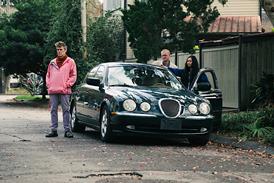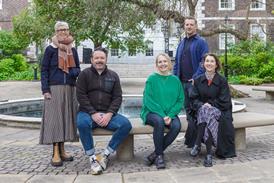Molinaire managing director Julie Parmenter has told Screen about how business at the UK post-production house has turned around since being placed in administration last summer.
When Parmenter took over as managing director at London-based post-production house Molinare in June last year, the ex-global head of sales and operations at Rolls-Royce was coming into a business in severe difficulty.
Molinare, the outfit that had posted such features as Moon, The King’s Speech and Man On Wire, had been placed in administration by previous owners, Indian outfit Century Communications, in the summer of 2012.
A consortium led by former owner Steve Milne and independent private equity group Next Wave Partners bought the majority of Molinare’s assets from the administrators and resurrected the company.
Renewed focus
Parmenter and her team immediately began slimming down the business.
“We took two of the buildings, not three, because we needed to prune back to make it stronger,” Parmenter told Screen.
Molinare’s emphasis, it was quickly decided, would be on giving clients what they needed, not in the company branching out into such fields as film investment, fund raising or production. Nor was VFX a priority.
The aim, Parmenter elaborates, was to concentrate “on what we are really good at. We have so much fantastic creative talent. Let’s be proud of what we are good at rather than trying to diversify into things that are not our forte.”
Independent British films - notably Clio Barnard’s The Selfish Giant, Ralph Fiennes’ The Invisible Woman, Dustin Hoffman’s Quartet - and big US TV series such as The History Channel’s The Bible have posted at Molinare in recent months.
Carnival Films’ new version of Dracula for Sky Living and NBC is also using Molinare’s facilities as are the producers of various feature-docs, among them The Man On The Moon.
Tax relief
Parmenter acknowledges that the business is benefitting already from the new “high-end television tax relief” in the UK.
She said: “It makes us competitive. With Toronto’s tax credits, Hungary and all the other markets out there, if the UK doesn’t match that system, we’ll lose our industry and our creative talent will just work elsewhere.”
There may be increasing blurring between high end TV drama and feature film but the Molinare boss still regards them as distinct categories.
“The film market is quite strong. I think the growth in the (TV) drama market will just allow us to expand. I don’t think it’s one or the other,” said Parmenter.
Tech investment
Like other facilities houses, Molinare invests heavily in new technology.
“The previous Molinare Ltd did huge investment in the grading and DI (Digital Imaging) side,” Parmenter said.
The aim now is to bring Molinare’s audio services up to the same standard.
Molinare’s shareholders are Steve Milne (now chairman), Parmenter, Next Wave Partners and Saphir Capital Partners. There is no intention at this stage to take the company public.
“We are too small and the wonderful thing about having Next Wave and Saphir as investment partners is their entrepreneurial spirit,” she explains.
“If they can see an opportunity, they will go for it. If you become too big, then the politics become involved.”
Rescue
Parmenter pays tribute to Milne’s part in rescuing Molinare. He first took over ownership of the business (together with Mark Foligno) in 2003 and then came back in when the business was struggling last year.
She said: “He has a passion and love for the people, the company and the brand. He put his whole life and soul into it to build it to what it was. Then, when it seemed in trouble, he couldn’t let it fail.”
Rolls-Royce experience
Parmenter herself has been able to draw on her experiences in management at one of the world’s most famous luxury car brands.
“Working for Rolls-Royce is very similar to how I see the film world,” the Molinare boss explained.
“Someone has a passion. They never needed a Rolls Royce but they wanted one. It was their life passion sometimes. They designed it how they wanted it. The film world to me in terms of how
the client wants to be treated is very similar. It’s their dream, their passion. It’s their creativity and we work with them to help them realise it.”
The end goal, Parmenter suggests, is invariably the same.
”It is all about customer service, all about how you delight a client, whatever the product.”

























No comments yet